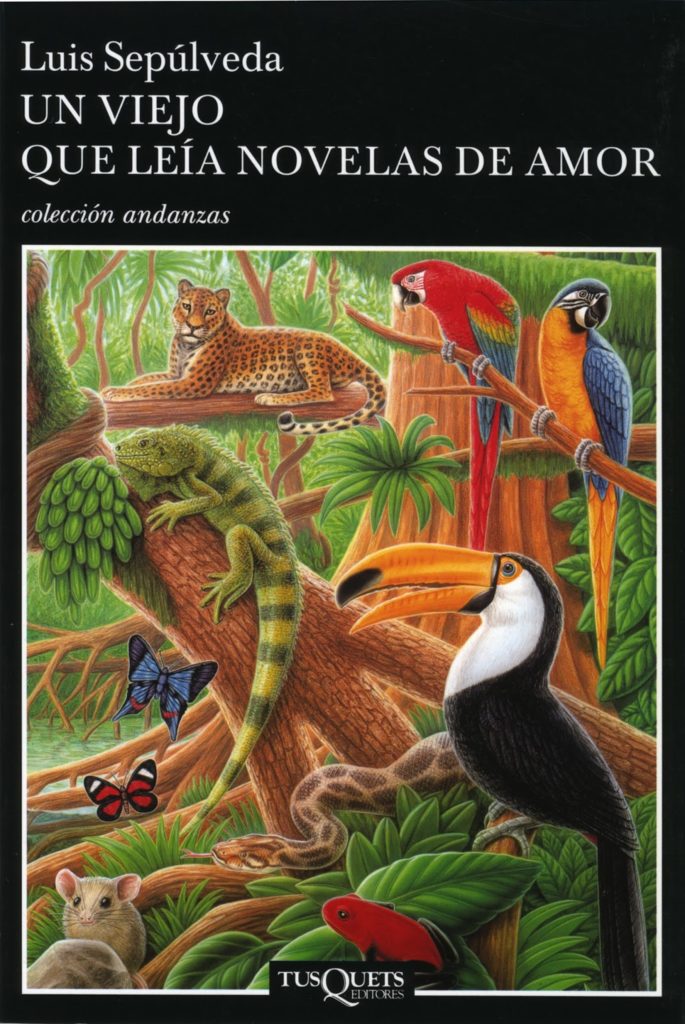At the Frankfurt Book Fair early in the 1990s, Beatriz de Moura from Tusquets publishers asked a Chilean journalist living in Germany if he had heard of a Chilean writer who was having great success in France. The book was by someone called Luis Sepúlveda. Laughing, the journalist admitted it was him.
Luis Sepúlveda (Ovalle, Chile, 1949) died on Thursday 16 April in the Hospital Universitario Central de Asturias, after a struggle lasting several weeks against the Covid-19 virus. He was diagnosed with the illness at the end of February on his return from a literary festival in Portugal.
New of his death brought expressions of sadness from literary figures in Italy, France, Germany and Spain. “We’re really saddened by his death,” said the Tusquets editor Juan Cerezo. “Luis was a very well-loved writer. He was very active in the annual Semana Negra of crime writing in Gijón, and in the festival of Ibero-American literature organized every year in Asturias. It’s terrible to see that the virus is such a killer.”

Sepúlveda began writing poems and short stories in his native, but became a huge international success with his novel Un viejo que leía novelas de amor (The Old Man Who Read Love Stories). This was the book Beatriz de Moura mentioned in Frankfurt, and which she went on to publish in 1993. It had previously been brought out in France, and as the Gallimard editor Gustavo Guerrero recalls: “Sepúlveda was a success in France before he was published in Spanish. He was an example of how the publishing industry was becoming globalised. There was already a long tradition of Latin American exiles in France, and in some way the figure of Sepúlveda gave a new face to that engageé literature.”
Before becoming this new Latin American literary sensation, Sepúlveda had worked as everything from a kitchen porter to an ecological activist. The son of a Chilean Communist Party militant and a nurse of Mapuche origin, he studied theatre production at the University of Chile in Santiago.
He himself said he was born ‘a deep red’, and joined the Communist party as a student. During the government of Salvador Allende in the early 1970s, he collaborated on the state-sponsored publication of a collection of paperback classics aimed at a mass public.
Arrested following General Pinochet’s coup in 1973, he was in prison for two and a half years before being released, thanks in part to the efforts of the German branch of Amnesty International.
After his release, he worked in Chile with a clandestine theatre group, then in exile in Uruguay, Brazil, and Ecuador, where he lived with a Shuar indigenous community.
In 1979 he joined in the Sandinista uprising against the dictator Anastasio Somoza, before leaving Latin America to settle in Germany. There he began to work as a journalist, and became active in ecological protests at one point becoming a crew member of a Greenpeace boat.
A great traveller, Sepúlveda put many of these adventures in his work, continuing in the line of writers such as Jules Verne or Conrad. This vein of exotic literature brought him great success in many countries, with his work being translated into more than 20 languages.
A prolific writer, he was the author of more than twenty novels, travel books, film scripts, and essays. His last book, Historia de una ballena blanca (Story of a White Whale) came out in Spanish in 2019. Some of his books were adapted for the cinema – Historia de una gaviota y del gato que le enseñó a volar, was made by the Italian director Enzo D’Alò, and a cartoon version of Un viejo que leía novelas de amor was made by the Australian director Rolf de Herr. He was awarded a French Légion d’Honneur medal, and was made a doctor honoris causa by Urbino University in Italy.
While living in Germany, his partner was Margarita Seven, with whom he had three children. In 1997 he moved to Gijón in Spain, and resumed his relationship with Carmen Yáñez, with whom he had lived in Chile in the 1970s. the mother of his son Carlos Lenin.
He was of the same generation, nationality and shared the same international renown as Roberto Bolaño, although their work has little in common. “However,” insists Gustavo Guerrero: “Both of them are orphans of the adventures of the Latin American Left. They are part of that generation that gave their lives for left-wing ideals that were in the air in the 1990s. Bolaño told part of that story, and there is something of Los detectives salvajes (The Savage Deterctives) in Sepúlveda’s own biography”.
Sepúlveda once summed up how he saw his vocation as a writer in the following terms: “Throughout history, good novels have been the story of those who lost, because the victors write their own story. We writers have to be the voice of the forgotten ones.”
This is an edited version of the obituary that appeared in the Spanish newspaper El País on 16 April 2020, translated for LAB by Nick Caistor. You can read the original here.
Main Image by Luis Sevillano Arribas/El País

